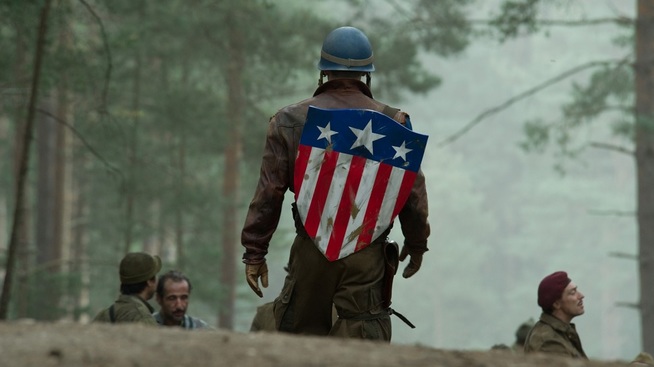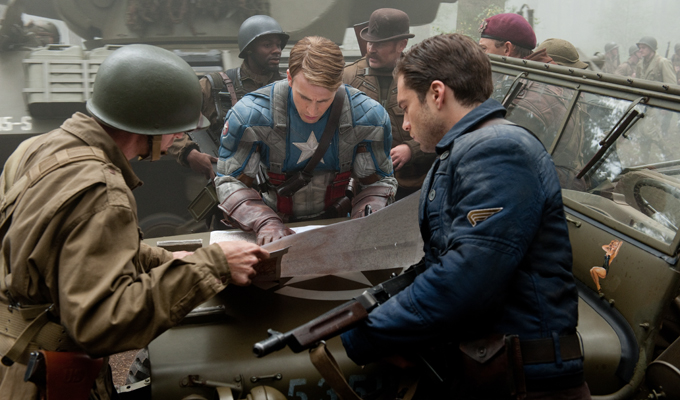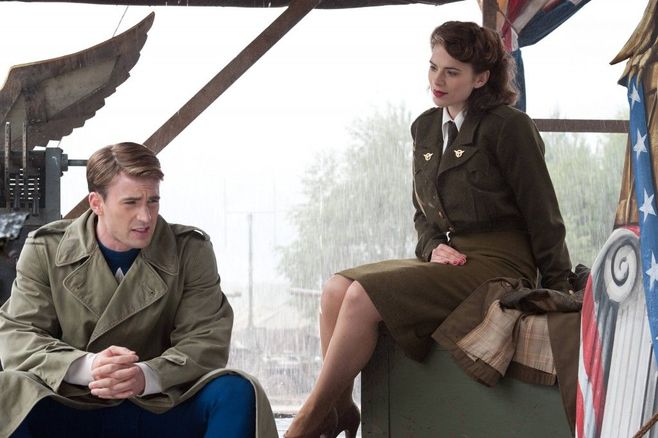|
by Luv Mehta The Marvel Cinematic Universe has probably been the most successful experiment by a movie studio, ever - we have thirteen movies in a single franchise in the span of 8 years, each part of an epic, interconnected universe with consistent continuity, and each guaranteed to make bank at the box office. A huge part of that is because nearly every movie feels different and unique from the other, so you never feel like it's falling into a rut, even with some of the standard franchising tropes it keeps using. We can have a swashbuckling rogue defeating terrorists, a bunch of a-holes going on an intergalactic adventure, a heist movie with a shrinking gimmick, and a conspiracy movie where the government isn't all it seems to be. And then there's Captain America: The First Avenger, that seems like the most traditional superhero movie out of the roster, but which, I promise to try and convince you, is the most unconventional - and one of the best. Let's back up a bit. Since the age of mythic beings, legendary heroes and Zorro, the age of superheroes has always been upon us, which proves that we've always wanted to see the ideal Übermensch save us from the dangers of the world and beyond - or even be one. Superheroes have always fluctuated between dark, brooding realists and wide-eyes idealists. From Zorro to John Carter, from Batman to Superman, we've always seen a fluctuation in our choice of most beloved superhero based on the age we live in. When Captain America entered the world in the 40s, he was a pure force of good, punching Hitler in the face, foiling nefarious plans by those wacky Nazis, and going on adventures with his young sidekick Bucky Barnes. As the World War ended and the Cold War neared, though, Cap's influence and relevance to the world lessened, appearing in some forgettable-to-bad comic storylines and ultimately being forgotten. Which was why it was a masterstroke to bring him back, from a state of suspended animation, into a world he didn't recognize - and which didn't recognize his archaic ideals of goodness and bravery. Captain America: The First Avenger was released in 2011, in a movie climate where The Dark Knight was still an object of obsession for comic book movie fans, the Taliban had just suffered a blow in the form of bin Laden's death, and the real-estate bubble burst was still fresh in the minds of the world. It was a dark world where violence and action and moral greys were recognized as essential to the fight against evil. In short, it was no world for the squares to preach. And yet it was. The world's much more complex than most superhero comic books or movies choose to represent, of course - good and evil are a matter of perspective, and the winners choose which to call which. We don't deal in white and black, but in a spectrum of grey that we feel is the best shade for the world. The 21st century, of course, has made people demand that they be given stories that represent these greys exclusively, to reflect their world with more accuracy - even if white and black do exist in it, too. And that's why we've had an unhealthy obsession with superheroes who didn't start off heroic, but had heroism thrust upon them due to some turn of events. Would Bruce Wayne have been Batman if his parents hadn't been shot that fateful night in Crime Alley? Would Tony Stark, in the MCU, have ever turned to the saving-people-business if he didn't witness the destruction caused by his own weapons, firsthand? The superheroes we now choose to love don't realize on their own that the decision to help other people is a meritorious one - they always have that decision thrust upon them, and we evidently find this trope of the unwilling person being forced into the role of good much more interesting than the alternative. Look at the bank even bad movies like Batman v. Superman make - the heroes there barely qualify as heroes, since they're so deep in their own neuroses and depression and feelings of emasculation that they couldn't care less about the lives they occasionally choose to save. And that's what makes Captain America so different. Because he chose to be Captain America. The script for the movie is proudly old fashioned, and Christopher Markus and Stephen McFeely have established how good they are with the character by now, and Joe Johnston might have just made his Magnum Opus with this movie, seeing how it's everything The Rocketeer was and more. But none of it would have mattered if they didn't get a good actor who got the character so well, who knew how to portray a potential simpleton with layers of complexity, who could act like the paragon of pure good without seeming preachy or overbearing. And Chris Evans, in my humble opinion, delivers THE standout performance of the Marvel Cinematic Universe as the Captain, being the heart of the whole franchise. And none of it would have been possible without his first movie. To start with, it's amazing to see how, despite being bullied for his stature and patriotism all his life, all Steve ever wants to do is look out for other little guys like him, and even lay his life for them, if need be. It's his decision to try and get into the army again and again, it's his decision to risk his life by opting for the Super Soldier Serum, and it's his decision to go past enemy lines to rescue his fellow soldiers. He's a square even for his own time, but he's enthusiastic and driven towards his goal - and that goal is completely selfless. And that is why, among any of the MCU heroes and heroines, I would easily trust Cap with my life. And that's not even all that's great about the movie. Hayley Atwell as Peggy Carter is a revelation, one of the strongest characters in the MCU, and one half of the strongest romantic plotline in the series by half a mile. Pepper and Tony might have their playfully snarky dynamic, but Peggy and Steve are absolute equals, with their affections for each other coming from mutual respect. There are few scenes as heartbreaking as their final conversation on the radio, as they realize they'll never have the future they wanted in the peaceful world they helped create. It's never made explicit, of course, only alluded to in reference to a shared dance they won't be able to have, but that's part of why makes it so great - it doesn't need to make state what we already know, seeing these two characters with great chemistry, trying to talk to each other for as long as they can, for what they believe will be the last time ever. And the supporting cast! We've got Hugo Weaving as the Red Skull, delightfully hammy and memorable, Tommy Lee Jones as the colonel with some of the best lines in the whole movie, Stanley Tucci as Erskine in an excellent, yet subtle performance, Dominic Cooper as Howard Stark with some great scenes - this movie is fit to burst with memorable characters played by great actors, and there are so many moment-to-moment scenes that are great (the Colonel offering Zola some steak, the Captain and Peggy in the bombed out bar, Howard ordering his men to keep searching for Cap's body).
Is it perfect? No, of course not. In the interest of the future movies, Steve's friendship with Bucky could have been explored further. Plus, just as we’re about to see how he gained his strategic skills and leadership qualities, the film decides to cut away to a montage. Yes, it’s a very cool montage, to be sure, but it makes the film feel incomplete as a result. When future reference is made towards his activities in WW2, we can’t help but wish we were privy to all of it. Even then, though, it's one of the strongest films in the MCU, as well as being one of the strongest superhero origin stories ever, period. Even its sequels ended up being so great because of its own strengths - would Cap's indignation at the modern world and its new brand of anti-terrorism have carried any weight if we didn't see the simpler time he belonged to? And it spawned the first great Marvel TV show, too, with Agent Carter giving Peggy the focus she rightfully deserved. And in the end, isn’t it a miracle that a hero named Captain America became an all-inclusive beacon of hope for humanity, and the figure that restored our faith in the idea of heroism itself?
Follow us on Facebook and Instagram to be notified whenever we release new articles.
Do you use an RSS reader? Even better!
0 Comments
Leave a Reply. |
Categories
All
Archives
December 2022
|



 RSS Feed
RSS Feed
